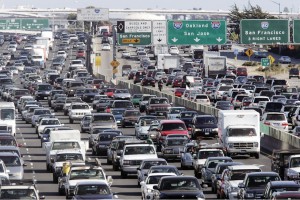
According to a new report, 57% of people around the globe believe their lives would be more difficult without a car.
To paraphrase a frequent comment about guns, “I’ll give up my car when you pry the steering wheel from my cold, dead hands.” Or so the majority of people surveyed essentially told researchers looking into the global influence of the automobile.
An estimated 90 million cars will be sold this year worldwide, an all-time record. And from China to Cameroon, the automobile is becoming ever more present in emerging markets as well as the industrialized world. And it is getting a welcome reception, according to a study by the International Organization of Motor Vehicle Manufacturers, or OICA.
The group’s new research found 57% of people globally say their lives would be harder and more difficult without a motor vehicle.
Surprisingly, the highest percentage was in Africa, the continent with the lowest penetration of motor vehicles on a per capita basis. According to OICA, 78% of those surveyed in Africa said they couldn’t imagine life without an automobile. The figure wasn’t far behind in the Americas, at 63%.
Consumers in Europe – where there is a growing movement to reduce the auto’s influence and, in some cities, to ban it outright – the figure was 56%. Curiously, in Asia, where auto sales have been growing at a double-digit pace, less than half of those surveyed – 48% – said they would have a hard time living without a car.
“The conclusions are quite clear and positive, with the car seen as an object of desire, providing many important advantages compared to any other transport mode: globally, consumers view the car as comfortable, practical, fast, safe, and future-oriented,” said OICA Vice President Matthias Wissmann, who also serves as president of the German Association of the Automotive Industry.
The study’s release coincided with the opening of the 2015 Frankfurt Motor Show, the largest automotive event in the world. As many as 10,000 reporters from around the world attended the show’s two-day media preview, and hundreds of thousands of potential car buyers will continue streaming through the turnstiles at the sprawling Frankfurt Messe in the days to come.
The show underscored the dramatic changes rapidly transforming the auto industry, “disruptors,” according to Renault/Nissan CEO Carlos Ghosn, such as electric propulsion, autonomous driving and connected vehicle technology.
(GM reportedly ready to settle ignition case with Justice Department. For more, Click Here.)
“Imagining the car (to come) 10 years down the road is difficult,” Ghosn said, adding that poses significant challenges for the auto industry.
The OICA study suggested that the public believes the industry will eventually get it right.
“The industry scores extremely high” in the survey, noted Wissmann, in terms of developing greener powertrain technologies.
And despite a sharp increase in safety-related recalls – and the annual, worldwide deaths of about 1 million people due to highway crashes – OICA found the auto industry enjoys an overall solid reputation.
(Click Here for details Daimler’s plan to move its U.S. headquarters to Detroit.)
There appears to be a connection between the positive regional ratings and the availability of reliable transportation alternatives. Africa has the poorest mass transit infrastructure, Europe the most well-developed.
In the traditionally car-centric Americas, there’s been growing frustration with the automobile, particularly in increasingly crowded urban areas where traffic jams have become endemic.
Despite the overall positive sentiment by consumers around the world, there is a growing anti-automotive movement in many parts of the world. In traffic-snarled, smog-covered China, Beijing and a number of other cities have now enacted severe restrictions on new vehicle registrations. In Europe, meanwhile, a number of cities are considering even more draconian measures. Hamburg, for example, may ban motor vehicles entirely, while others might bar all but zero-emissions vehicles.
(To see more about the new Honda Civic sedan, Click Here.)
Industry leaders, like Renault/Nissan’s Ghosn, contend that to keep demand for automobiles building, the industry will need to resolve issues like traffic congestion and pollution, and those “disrupters” are likely to provide the answer.

In the small cities of the rural deep south of the USA the spread of A/C and of the automobile make possible a non-agrarian society. All of them are shrinking as technology replaces semi-skilled labor, but they wouldn’t be livable without someone in each family having access to a car. That’s probably why in this State there is no inspection of any kind whatsoever. If it will move, you can drive it, even if only in the daytime because all the lights are broken. Keeps the $500 jalopy a reality here.
The U.S. has so many geographic areas where there is no mass transit that it will always have a very high percentage of personal autos and they won’t be EVs or AVs because they make no sense for most people. It’s difficult for many people to afford one reliable vehicle let alone two because their EV is not suitable for long distance travel.
Not everyone has three new lease vehicles in their driveways though there seems to be plenty of people in the U.S. who do. Poverty definitely sucks. That’s why the car companies who build factories in the South are able to exploit workers.
So much for AVs taking over the world.